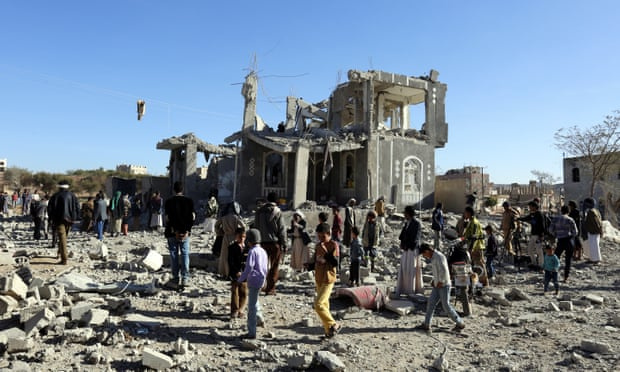The Worsening Saudi Quagmire in Yemen

Saudi Arabia's agony in Yemen, a product of its reckless military adventurism since spring 2015, has now become worse by the Yemeni separatist coup in Aden which has dislodged the nominal government of Mansur Hadi, already lacking legitimacy inside Yemen. The forces of Southern Transitional Council (STC) seeking an independent South Yemen government have routed Hadi's forces and are now in command of the public buildings in Yemen, knowing full well that even if under Saudi pressure they consent to vacate those buildings, the momentum set for their political domination of the South Yemen landscape is inescapable.
In their various pronouncements, the STC leaders have made it abundantly clear that they are not interested in Yemen's reunification and their ultimate objective is a 'back to the past' resurrection of an independent South Yemen government, irrespective of the wish of the Saudi-led coalition, which has waged a long war in the name of restoring the deposed Yemeni government to rule over all of Yemen. Armed and trained by this coalition ever since Aden was retaken from the Houthis' hands in 2015, the STC forces, comprised of several militia groups and retired military officers from the pre-unification era, have the implicit backing of US government which is well aware of the futility of hedging the bets on the return of Hadi who has been in (self-imposed) exile in Saudi Arabia for the past five years.
The separatist coup is, simultaneously, a major blow to the UN-led efforts which are based on the deeply-flawed UN Security Council Resolution of 2216 that calls for the reinstatement of Hadi's government and the unilateral disarmament of the Houthi forces. UN has been a part of the problems in Yemen, due to the pro-Saudi biases of the Security Council and the current Secretary General, Antonio Guterres, and must make serious adjustments to its present approach toward Yemen that indeed leaves a lot to be desired irrespective of the valiant efforts of the UN envoy for Yemen, Martin Griffiths.
Until now, Griffith’s mediation has been binary, involving the Houthis and the Hadi government, which for all practical purposes turned into a shell without content. It cannot even command the mercenary Sudanese forces in Al Hudaydah to abide by the terms of the Stockholm agreement, which has been implemented by the Houthis. Griffith needs to adopt a more inclusive approach by reaching out to all the local and regional stakeholders in the Yemen conflict, and to seek a new UN mandate that does not reflect the unrealistic and unobtainable objective of restoring Hadi to the throne.
Contrary to what has become an article of faith in Western media and the vocabulary of most Western experts, to call Hadi's government "legitimate" is a misnomer. Lest we forget, Hadi was the vice-president of a corrupt and dictatorial regime that was toppled by the infliction of the Arab Spring, his 2-year interim appointment ran out in 2014 and was unduly extended by the National Dialogue Conference without the benefit of an election. Irrespective, the Saudi-led coalition, whose own history is rife with repeated palace coups and authoritarianism, used Hadi's call for external intervention against the Houthis to pulverize an entire nation, eliciting huge outcry by the world's human rights organizations accusing the Arab coalition and its Western backers of crimes against humanity.
The question for the Saudis now, who are still reeling by the negative results of their murder of the dissident Khashoggi in their consulate in Istanbul last October, is how they can continue business as usual with respect to Hadi, when in fact the mask has fallen and the man is increasingly a liability rather than an asset for Riyadh's objectives in Yemen? It is possible that the reported rifts between Saudi Arabia and UAE over Aden is to some extent exaggerated and that is why the Saudi forces did not rush to assist the government forces during the August 7-10 clashes in Aden, letting the chips fall where they may. Of course, the Saudis have to save face by pretending that they are still fully committed to the Hadi government, which in the best circumstance can survive by allowing a huge influx of STC and thus turning into the latter's Trojan horse.
Another big question is how the changes in Aden affect the trajectory of war in Yemen? Can the South turn into an "island of peace and stability" under the STC control, or will it simply sow the seeds of another north/south conflict down the road? Hasty unification in 1990 led to a number of unresolved issues and dissatisfaction that boiled in 1994, resulting in what the STC politicians commonly refer to as North's "occupation" of the South. Prior to unification on two occasions in 1973 and 1979 the two sides fought border wars, which can be ignited again if the STC achieves its ultimate goal sooner or later.
From the vantage point of north Yemen, the resource-rich south Yemen should not be independent as this would exact a toll on the north's economy. Yemen's oil belongs to all Yemen people and not just those inhabiting the southern provinces, all the more reason for the UN to press on a revised script for Yemen federalism, and to pressure the Arab coalition from partitioning Yemen following the familiar 'divide and conquer' maxim, recalling how the Saudis fueled the fire of separatism during the 1990s. Today, the incoherence of their dual approach, in giving political support to a government of "national unity" while aiding the separatists, has reaped a bitter harvest, which has been described by some as a "civil war within a civil war," although the basic problem with this description is overlooking that the Yemen war is first and foremost a war of aggression by a group of authoritarian oil monarchies against their poor yet defiant neighbor.

